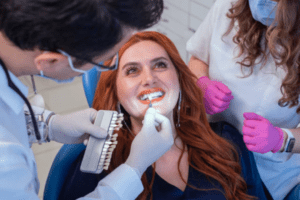Have you ever been brushing or flossing your teeth and noticed you’re rinsing out blood? If so, you are a part of the 60% of the population that has experienced bleeding gums. Do you feel that bleeding gums are a normal experience? Then you are a part of the 1 in 3 that share this belief. However, this is an inaccurate idea. Healthy gums do not bleed.
Blood of any kind from your gums is something to be concerned and aware about. While there are some reasons gums might bleed that aren’t alarming – a new toothbrush that is firmer than your last, or a non-effective way of flossing – the fact of the matter is that healthy gums don’t bleed. If yours are bleeding, you need to be aware of the situation and get in to see your dental provider.
The most common cause of bleeding gums are gums that are not being cared for properly. This causes a buildup of plaque – or a sticky film that is made of bacteria and covers your teeth – and calculus – hardened dental plaque – along your gumline. This plaque is the cause of gingivitis, which if left untreated can lead to a more serious form of gum disease called periodontal disease. Gingivitis is a very common and mild form of gum disease that can cause red, irritated and swollen gums. Periodontal disease is treatable with a deep cleaning called scaling and root planning with a dental hygienist. With simple good oral home care, however, gingivitis is completely curable.
Other causes of bleeding gums includes brushing too hard or with a toothbrush that is too firm, a new flossing routine that your gums aren’t used to yet, medications such as blood thinners, vitamin deficiency, pregnancy gingivitis, use of tobacco products, and partials or dentures that don’t fit correctly. While each of these situations present their own challenges, they are all preventable and treatable.
Besides brushing twice a day with a soft bristle toothbrush and flossing once a day, there are other possible solutions for bleeding gums. First, it is very important to see your dentist twice a year to try and see the signs of gum disease in their early days. Adding the use of anti-gingival toothpaste – that can help breakdown the calculus, repair the enamel of the tooth structure, and also treat dental sensitivity – increases the chances that brushing alone can prevent gum disease. Staying away from using tobacco products and overall living a healthy lifestyle also contribute to not only the prevention of gum disease, but overall a healthier life. Mouthwashes have also shown to help prevent gum disease. Applying multiple of these prevention measures can increase your chances of preventing bleeding gums.
If you or someone you know is having issues with bleeding gums give us a call at 513-868-0669! We will get you into the office and have Dr Fattahi give you a thorough exam to see what the cause of the bleeding is and educate you in what you need to do to alleviate it.
 Healthy gums do not bleed.
Healthy gums do not bleed.
Healthy gums do not bleed.
Healthy gums do not bleed!
Bleeding gums are a sign of infection. Healthy gums do not bleed. Brush and floss the area well. If bleeding persists, Contact Us immediately for an appointment.
Infection can lead to Gum Disease and tooth loss. Bleeding gums can often be your first indication of infection. Early stages of Gum Disease are rarely painful, so bleeding gums may be your only indication of Gum Disease! Healthy gums do not bleed.
So what’s the moral here? Healthy gums do not bleed!



